

|
 |
Alan Plater at ITV (TV)
R2 - United Kingdom - Network Review written by and copyright: Paul Lewis (25th April 2011). |
|
The Show
 Alan Plater at ITV 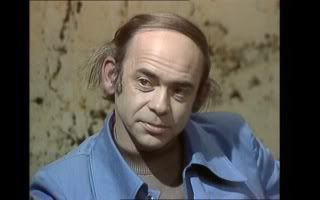
Along with a number of other key figures in British television and theatre of the 1970s and 1980s (including John Hopkins and Troy Kennedy Martin), Alan Plater made his mark as a writer for the social realist crime series Z Cars (BBC, 1962-78). As John Russell Taylor (1978) has noted of the era, ‘[a]t one time, in the ancient history of the New Drama, it looked as though television might be the great new outlet for great new playwrights’ (172). Taylor contrasts Plater with his contemporary John Hopkins, suggesting that where ‘Hopkins in his writing is a passionately intense introvert, Plater [is] an ebullient extrovert’ (ibid.: 181). Born in Jarrow in 1935 and living in Hull for most of his life, in his work Plater often dealt with themes of working-class life, often (but not always) in the North of England. Emerging as a writer during an era in which television, theatre and cinema were becoming increasingly interested in life outside London, Plater claimed that timing was important in his career: he once asserted that ‘I grew up as a writer in the 1960s, when the rapid expansion of television created a more congenial marketplace for non-metropolitan dramatists’ (Plater, 2005: 112-3). However, Plater resisted being labelled as a ‘Northern writer’, suggesting that the label – popular during the 1960s – was reductive and ignored the diversity of voices within the North of England: ‘The non-metropolitan piece became a genre in its own right [during the 1960s]. At the crassest level, it was good box office. But the setting was an ill-defined, generalised lump of good earth called “The North”, and the writers were categorised as “Northern writers”’, he once wrote (ibid.: 114). Like Ian Le Frenais, Plater attempted to capture and record the ‘voice’ of the North-East and bemoaned the fact that for much ‘non-metropolitan’ television, ‘in terms of accent, “near enough was, generally speaking, near enough”’, an ethos that betrayed the ‘lack of specificity about many early northern settings’ (ibid.: 121; Plater, quoted in Russell, 2004: 190). At the forefront of regional drama in the 1970s, Plater believed that writers had a responsibility to be socially engaged: in a 1993 lecture, Plater asserted that ‘I think that writers, along with their fellow artists, are the most important people in history of the world. Painters show what it looks like, composers what it sounds like, and writers what it feels like to be a human being. It is an awesome responsibility though the average professional writer will tell you it’s much better than having a job in an office and much safer than digging for coal or catching fish in the North Sea’ (Plater, 1993: 118). Plater also once suggested that ‘[s]tudio drama works best […] when the subject of the play is faces [… in] claustrophobic situations with people locked in a set of relationships. But when you move outside the studio the power of the visual image is much much greater’ (Plater, quoted in Hunt, 1981: 137). Both approaches are evident in this set of television plays by Plater, a scattershot selection of some of the work Plater produced for ITV in the 1970s and 1980s which is really a ‘taster’ of the respected writer’s work: the first disc contains a series of studio dramas, quite claustrophobic in their themes and presentation, whilst the second disc (beginning with Plater’s feature-length Coming Through and ending with ‘The Intercessor’, an episode from ITV’s supernatural anthology series Shades of Darkness) features three dramas that make heavy use of location work and are much more ‘filmic’: all three dramas on the second disc make striking and effective use of the English countryside, with ‘The Intercessor’ particularly potent in its use of its isolated rural setting to create a sense of unease similar to the unnerving use of the Norfolk landscape in Lawrence Gordon Clark’s 1972 adaptation of M R James’ ‘A Warning to the Curious’ (for the BBC’s Ghost Story for Christmas strand). 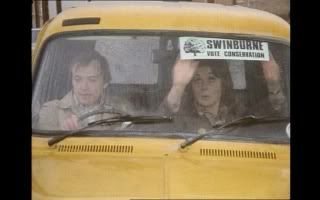
Disc One begins with the first episode of Plater’s series The Beiderbecke Affair (Yorkshire, 1985), ‘What I Don’t Understand Is This…’. The first entry into Plater’s ‘Beiderbecke trilogy’, which would also include The Beiderbecke Tapes (Yorkshire, 1987) and The Beiderbecke Connection (Yorkshire, 1988), The Beiderbecke Affair drew on the screwball comedy-mysteries of the 1930s and 1940s. In its focus on the relationship between woodwork teacher Trevor Chaplin (James Bolam) and English teacher Jill Swinburne (Barbara Flynn), who unwittingly become embroiled in a mystery, the series recalls the relationship between Nick and Norah Charles in The Thin Man (W S Van Dyke, 1934) and its sequels. Plater’s script (and Bolam and Flynn’s delivery) captures the dry and witty quickfire overlapping dialogue of the screwball pictures, and as with the screwball-era mysteries, the focus in The Beiderbecke Affair is more on the characters than the plotting of the mystery in which they become involved. The era of the 1920s and 1930s is also evoked through the series’ use of Bix Beiderbecke’s music, anchored by Bolam’s character’s obsession with Beiderbecke. ‘What I Don’t Understand Is This…’ establishes Swinburne and Chaplin’s relationship, with Chaplin wanting to go to the pictures but Jill thinking otherwise. Chaplin decides instead to spend the evening listening to his Bix Beiderbecke LPs. ‘When in doubt, hide behind your music’, Jill jokes. ‘I’m always in doubt’, Chaplin replies dryly. With this, the contrast between the politically active Jill – who in this episode reveals her intention to stand as a candidate for the local council – and Chaplin – who prefers to spend his time watching football and listening to jazz – is outlined. That evening, Chaplin is listening to his records when the doorbell rings. He answers it and finds a glamorous blonde, Janey (Sue Jenkins), on the other side of the door. Janey attempts to sell Chaplin clothes from a mail order catalogue. ‘Do I look like I buy clothes?’, he asks her. ‘Did you steal all them records? So you buy records’, she presses him, showing him the records for sale in the catalogue she is carrying. However, Chaplin sharply describes the records in the catalogue as ‘Mickey Mouse records’ but repents a little when Janey tells him that she is selling from the catalogue in order to help the local cub scouts’ football team. Chaplin offers to make a donation and involves Janey in a conversation about his hobbies, revealing that he is seeking four specific Bix Beiderbecke records. Janey reveals that she can sell all four records to Chaplin for the paltry sum of £10. 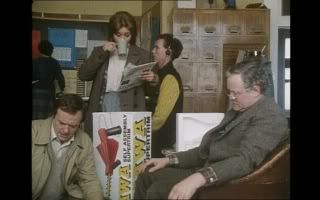
However, at work the next day Chaplin is approached by one of his colleagues, Mr Carter (Dudley Sutton). Carter presents Chaplin with a problem: a hedge trimmer with an instruction manual in Japanese. ‘My professional advice is, take it back to the shop’, Chaplin tells him. ‘I didn’t buy it at a shop: I bought it at the door’, Sutton tells him – apparently from the same woman who visited Chaplin. Chaplin begins to have doubts about Janey’s honesty, and these doubts are confirmed when Chaplin’s LPs arrive. Jill opens them for him: ‘Prepare yourself for a slight disappointment’, she tells him before revealing that he has received none of the LPs that he bought. Deciding to confront the catalogue company, Chaplin rings the telephone number on his receipt, only to find that the number belongs to the local crematorium. Visiting the address with Jill, he discovers that it is in the middle of an estate that has recently been demolished. 
Thus begins a mystery that sees Chaplin investigating the local cub scout troop (‘I’m sorry to interrupt you in the middle of your dob-dobs’, he declares when walking into the middle of one of their meetings) and being accused of being a ‘prowler’, and ultimately refereeing a cub scout football match. Typical for Plater’s work, in the midst of the dry humour is a scattering of social comment. When Chaplin and Jill arrive at the demolished estate, Chaplin surveys the ruined houses and asks, ‘Has it got a name’. ‘Redevelopment’, Jill asserts. ‘Where I come from, there always doing this, in that funny place where people say “ah-way”’, Chaplin declares. Later, there is an oblique criticism of the surveillance society and its definitions of deviance when, after being accused of being a prowler due to his interruption of the cub scout meeting, Chaplin is surprised to be told that he has been identified in the files of the local police force due to his association with Jill, who is allied with the environmentalist movement: a detective, Detective Sergeant Hobson (Dominic Jephcott), tells Chaplin, ‘Mrs Swinburne is in our files because of her fringe political activities; you are in our files because of your association with it’. The detective’s statement amounts to little more than an offhand comment in this first episode, but in the context of the Beiderbecke trilogy as a whole (which deals with themes of corruption and espionage), it is an index of an anti-authoritarian attitude that runs throughout all three series. 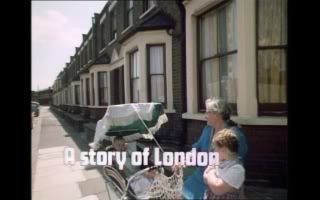
A more solemn drama follows: ‘Brotherly Love’ (from LWT’s London-based anthology series Oranges and Lemons, 1973) opens with shots of London: a shot of Tower Bridge is followed by contrasting images of working-class housing, traditional back-to-back terraces contrasted with modern blocks of flats. A caption declares this to be ‘A story of London’. Ex-docker Joe Sewell (Tony Melody) works in the local bookies and his strong socialist views are highlighted from his first scene, in which he complains that Ascot is bourgeois and, when asked by a customer if he is all right, replies, ‘Yeah, if you know what I mean. It’s the system, innit’. Joe’s son Terry (Dennis Waterman), who like his father is a docker, is given a tip on a race running at Ascot. Terry bets on the race and wins, using the winnings to buy a watch for his young niece Katie (Emmy Brooks). 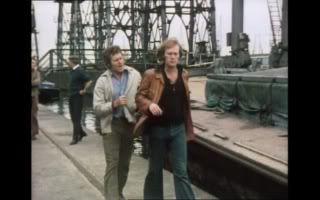
Terry has a combative relationship with his brother Douglas (Ray Brooks), Katie’s father. Douglas also works on the docks, but in a management position: he represents the aspirations towards social mobility that run throughout much of 1970s television drama and comedy. ‘He’s gone all posh, hasn’t he. He’s… what was that word you used to use that I never could say?’ Terry says to Joe. ‘Bourgeois’, Joe tells him. Meanwhile, Douglas is keen to distance himself from his working class background: ‘Enough of that working class street bit’, Douglas tells his wife Anne (Jane Lapotaire) in the kitchen before confirming that in his youth, he was only concerned with ‘getting out of it’ (‘it’ being his working class background). However, Joe is proud of the fact that Douglas has settled down, whereas Terry is still rootless. ‘He’s settled down with a nice girl’, Joe tells Terry. ‘Yeah, right. I’d rather find a naughty girl and not settle down’, Terry jokes. Although Terry has inherited some of his father’s views on social class, he doesn’t understand the depth of Joe’s association with the dockers’ union. Terry suggests that the union is there to help the dockers get what they want. However, Joe has a different, more idealistic perspective, telling his son, ‘Is that all the union’s for now, getting things? [….] Listen, when I talk about the union and all the work I put in, that was part of a dream, a vision […] for equality: all men equal, all helping each other [….] A brotherhood’. However, Joe sees the irony in his commitment to the union and his inability to bring together his two warring sons: ‘You’ve got to admit [that] it’s a bit sad for a father who spends all his life preaching about solidarity and brotherhood and can’t even bring solidarity between his two sons’. When one of the other dockers is arrested for selling stolen goods, including watches that are similar to the one Terry have Katie for her birthday, Douglas and Terry grow even further apart. Douglas is convinced that Terry was involved in Ericson’s criminal dealings. (Interestingly, Plater’s script never confirms or denies Terry’s association with Ericson’s activities as a ‘fence’: in the face of the conflict between Terry and Douglas, and what it represents, the question of Terry’s presumed guilt is a non-issue.) ‘It’s a stain that rubs off on all of us – dad and Katie’, Douglas tells Terry angrily. The conflict between Douglas and Terry leads Joe to declare bitterly, ‘You grew up, didn’t you, eh. Both of you. And now you spend your time sticking knives in each other, every chance you get’. 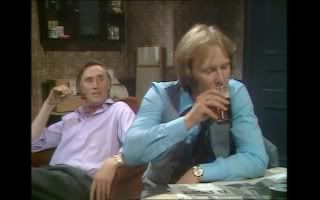
However, despite his admiration of Douglas, Joe’s sympathies are still with Terry; in a late, beautifully-acted scene, Joe tells Anne that whilst Douglas may be on the ‘outside’ (ie, he has escaped his class background), ‘Now, Terry, he’s still on the inside; he’s a survivor, you see. He does all right; nobody pushes him around. Now, he’ll take every penny he can get, and he’ll break the rules and all, if he fancies it. He’ll walk off with the rest when the call comes, and all that, you know. He’s a survivor, in his own fashion that is. Of course, he might end up in the nick. We all run that risk, don’t we? There’s temptation all around us, and I suppose a lot of nice things in life, and if you can’t afford them, well… [….] Douglas, he’s got a nasty case […] [of] ambition [….] He’s always been keen to get on, get on and get out [….] Somehow you can’t leave everything behind, can you; it still drags on your ankles […] so you end up not knowing who you are or where you are’. When asked by Anne if you have to be one or the other – ‘one of the lads’ or a member of the aspiring middle class – Dan replies that it’s impossible to be both due to ‘tradition’: a man has to make his decision and stick with it. ‘Brotherly Love’ is a solemn drama about social class and the family, in contrast with The Beiderbecke Affair’s dry humour. (In its coverage of these themes, ‘Brotherly Love’ is worth comparing with Trevor Preston’s thirteen-part drama about a London family, Fox; Euston Films/Thames, 1980.) The episode is held together by a great performance from Tony Melody as Joe, the patriarch who struggles to hold his two differing sons together. 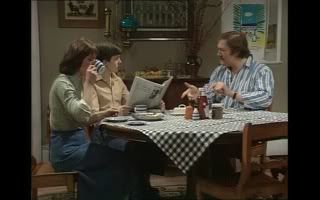
The theme of the family is also at the heart of ‘The Party of the First Part’, which Plater scripted for the anthology series Play for Love (Yorkshire, 1978). Superficially ‘light’, ‘The Party of the First Part’ explores a familiar social trap from Plater’s other work – that of a man trapped in his job. In this case, John (Michael Gambon) is trapped in his mundane job as a commercial artist and uses humour as a coping mechanism, filling his conversations with allusions to vaudeville and early film comedy. (The episode itself takes its title from the contract negotiation scene in the Marx Bros’ 1935 film A Night at the Opera, directed by Sam Wood.) John’s quiet, studious son Peter (David Parfitt) is soon to celebrate his eighteenth birthday, and John and his wife Margaret (Anne Stallybrass) want to stage a party for the occasion – against the wishes of Peter, who would rather celebrate his birthday more quietly. ‘You realise that in my day, when all this was fields, you weren’t allowed to be 18 until you were 21’, Gambon jokes, telling his son, ‘The age of 18, in a way, marks the end of the first part of your life [….] If you had a party, it would be, so to speak, “The party of the first part”’. 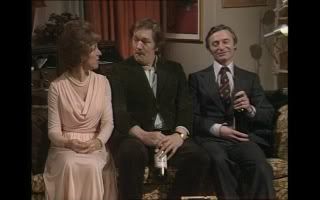
Peter asks his father about obsession with jokes, and John reveals to Peter his secret obsession with early film comedy, introducing his son to the Marx Brothers and W C Fields. ‘These people, they comfort me; they preparest a banana skin in the presence of mine enemies’, John tells his son about his favourite comedians, whose images he has concealed beneath a noticeboard in his office at home. 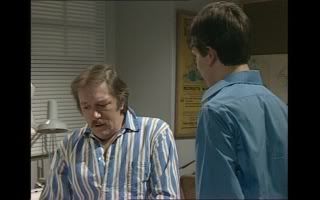
With an sharp and witty script (that is arguably a little wearying), ‘The Party of the First Part’ makes for an interesting comparison with ‘Brotherly Love’, in that both deal with the family; but whereas in ‘Brotherly Love’ the differences between Terry and Douglas seem insurmountable, ‘The Party of the First Part’ paints an optimistic picture of family life as place of stability and a means of escape from the demands of work (‘You know, the way he’s going, I could end up being proud of my son. That’s a frightening thought’, John notes), and offers an ambivalent perspective towards the rights of passage through which all young adults must pass. ‘He’s just growing up’, John asserts about Peter. ‘Have you ever considered growing up?’, Margaret asks John. ‘No, that would spoil everything’, John replies. 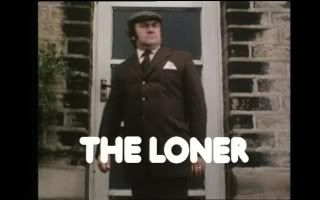
Written by Plater for Les Dawson in 1975, The Loner (produced for Yorkshire Television) was a series of three comic plays which featured Dawson (playing a character with the same name) battling against petty bureaucracy: ‘Dawson’s Complaint’, ‘Dawson’s Connection’ and ‘Dawson’s Encounter’. ‘Dawson’s Complaint’ is presented on this set and opens with a stern-faced Dawson leaving his isolated rural house in Yorkshire, a Joe Friday-esque voiceover – a dry parody of the ‘voice’ of hardboiled fiction – presented over images of Dawson striding purposefully: ‘Ten o’clock on a Sunday morning. I set out, unwittingly, to change the world. This is the story of my failure’. Dawson marches into the local village shop. ‘I’m getting some more of them American magazines’, he is told by the shopkeeper: ‘Mind you, there’s a waiting list’. Dawson waves off the comment and asserts simply that he is there to ‘register a complaint’, demanding ‘a piece of paper big enough to write on even if you’ve nothing to write on it’. When presented with a piece of paper, Dawson uses the pen in his pocket to pretend to write on it. ‘But there’s nothing written on it’, the shopkeeper asserts. ‘The bloody pen won’t work’, Dawson retorts angrily: that’s his complaint. The shopkeeper grumbles that the pen only cost a shilling but declares, ‘I could replace it, I suppose’. 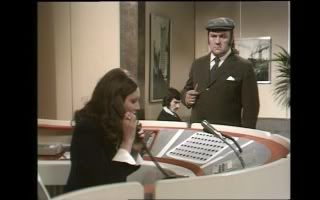
However, this isn’t enough for Dawson, who takes his battle to the London-based head offices of the company that supplied the pen to the shop. ‘London, city of flashing lights, corridors of power, fake smiles’, Dawson asserts in his voiceover as we see him walking through the streets of London. Confronting Harding (Brian Wilde), the director of the company that supplied the pen, Dawson declares, ‘I’m a consumer, except I’ve got nothing to consume, seeing as how the pen won’t work’. In response, Harding gives Dawson a series of excuses. ‘The pressure is tremendous’, he complains, suggesting that the company is overstretched; Harding tries to persuade Dawson to buy a fountain pen. ‘It isn’t for me’, Dawson asserts; ‘I’m down here on behalf of all the people who keep buying these rotten pens: the milkman on his rounds, making up his cash returns; the lads in the betting shop working out what they’ve got to come back on a two-way yankee; the shepherd in the hills…’ ‘In the hills?’, Harding asks. ‘That’s where he works’, Dawson responds. ‘Why’s that?’ Harding asks. ‘That’s where the sheep are’, Dawson adds matter-of-factly. Eventually, Hastings informs Dawson that ‘You’re in the wrong office’. ‘Which office should I be in?’ Dawson asks. ‘You want to be in the north of Scotland’, Hastings asserts: Hastings’ company sold Whirlwind Office Supplies, the subsidiary responsible for selling the pen to the village shop, to Global and Brotherhood Insurance, a company based in St Ives, Cornwall, but which is owned by a Scottish businessman, Lord Ross Cromarty (Cyril Luckham). 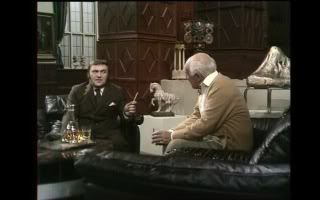
Dawson heads to Scotland and the home of Lord Cromarty, who tells Dawson that he is ‘merely a figurehead’ but promises to ‘have some enquiries made’ and ‘see that someone gets the sack’. This challenges Dawson’s commitment to his cause: ‘I don’t want anyone to get the sack’, Dawson declares. ‘Oh, but it gives one a certain animal satisfaction’, the businessman states; ‘Well, you can’t expect us to stop making things: it’s the way we make our money [….] It’s a difficult world. You can’t even rely on things to be unreliable’, Cromarty asserts when Dawson signs his visitor book and discovers that the pen in it, identical to the one he bought, works. Dawson is a great comic actor and here, as in much of his other work, he plays the frustrated ‘little man’ perfectly: Dawson’s character is so inconsequential to both Hastings and Cromarty that both men repeatedly mistake him for someone else (Comarty calls him ‘Thompson’ and Hastings calls him ‘Nesbitt’). This is a fantastic little episode, and the parodic hardboiled voiceover is an inspired touch. 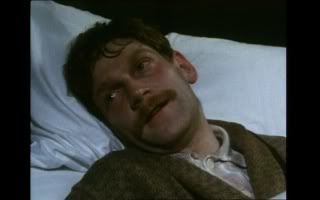
Disc two opens with Coming Through (Peter Barbar-Fleming, 1985), a feature-length drama about the life of D H Lawrence (played here by Kenneth Branagh). In D H Lawrence: Fifty Years on Film (2006), Louis Greiff asserts that Plater’s Coming Through and his earlier film about Lawrence, The Virgin and the Gypsy (1970), ‘constitute Plater’s rather complete screen biography of Lawrence, with the television production [Coming Through] ending in 1912 and the film [The Virgin and the Gypsy] picking up in 1914’ (204). Coming Through opens with idyllic images of the English countryside, interrupted by a modern train cutting across the screen. Inside the train, a young woman reading from a collection of D H Lawrence’s works. Cutting to the past, the film shows us a field; at the edge of the field sit Lawrence and Frieda (Helen Mirren), the woman who became his wife. 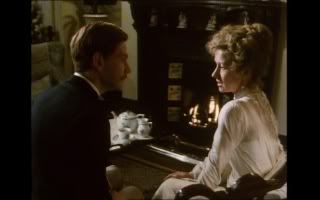
With this, the film establishes two parallel narratives that are developed throughout its running time: in the past, we are shown scenes from the young Lawrence’s life; in the present, Kate (Alison Steadman) - a mature student studying for an MA in literature – meets David (Philip Martin Brown) – another mature student – who helps her with the research for the thesis she is writing on Lawrence’s work. ‘We get hundreds of people like you, all searching for the secret soul of D H Lawrence’, David tells Kate in the university library where they meet. David is an ‘unemployed graduate […] but the cover story is, I’m doing an MA. That’s what you tell the DHSS’. He takes Kate to Lawrence’s grave. ‘He haunts this place’, Kate observes. ‘Ah, it’s all in the mind’, David responds. ‘Where else can it be?’ Kate asks enigmatically. Meanwhile, Lawrence is shown with his friend, and inspiration, Jessie Chambers (Felicity Montagu). Lawrence tells Jessie, ‘You can’t tell the truth without drawing blood’, adding ‘Look at this valley. See, there’s a music here, and nobody dares to sing it out loud. Shakespeare, he heard the music, and Chaucer; then it was taken away from us, the lords and masters built fences around it with big signs saying “Keep out. Art and literature, they aren’t for the likes of you. Touch your forelock and move on, or get yourself down the pit – where you belong”. But we know, Jessie, we know when we’ve been cheated’. 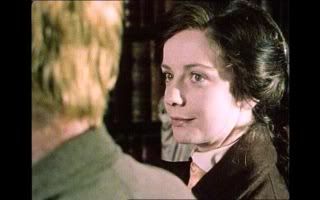
We are shown Lawrence’s childhood (where he is played by Robin Paul Bassford), and his relationship with his protective mother Lydia (Lynn Farleigh) and his drunken, bullying father Arthur (Malcolm Storry). The young Lawrence is pulled in two different directions by his parents, his father a coarse collier and his mother a member of the middle class; these two warring values, the film suggests, were integral to the formation of the young Lawrence’s worldview. In front of the child, Lynn comes into conflict with Arthur, telling him, ‘You’re an animal’. ‘We’re all of us bloody animals, Lydia’, Arthur reminds her; ‘It’s just that some of us are big enough to own up. It’s better than pretending to be a bloody lady’. When Arthur leaves, the young D H Lawrence asks his mother, ‘Shall I help thee?’ ‘Stop saying “thee” and “tha”’, Lydia snaps at the boy. ‘Me dad says…’, Lawrence begins to protest. ‘Don’t listen to your father’, Lydia interrupts: ‘listen to me’. ‘But I saw “thee” and “tha” in the Bible’, Lawrence retorts. The bulk of the film deals with Lawrence’s relationship with the married Frieda Weekley, who eventually became Lawrence’s wife. This narrative strand is developed in tandem with events in the present (in terms of the diegesis), and David’s attempts to establish an affair with the married Kate. However, although Kate admits that her relationship with her husband isn’t ideal, she isn’t willing to throw away her marriage for a fling with David. 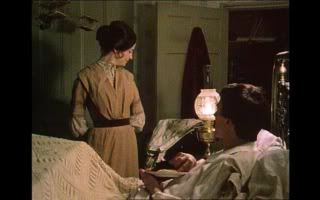
Branagh is excellent as Lawrence, for whom writing is primal activity that offers an escape from his background and a way of expressing his worldview: in one scene, Lawrence tells his friend Jessie that ‘The words are drawn from a deep well, full of blood [….] No, not from the heart; from further down than that’. Lawrence is also shown in conference with his friend and mentor, the social reformer William Hopkin (Norman Rodway), who reminds Lawrence – during his career as a schoolteacher - of the importance of challenging the status quo, telling Lawrence, ‘Every child goes to school now, but we must have working class lads to teach them, otherwise we’ll just perpetuate the values of the bourgeoisie’. 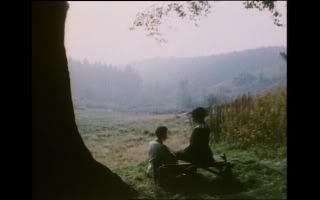
Lawrence’s commitment to regional dialect is explored in this film. (The Calendar People roundtable show, included as contextual material in this DVD release, contains some pertinent comments by Plater about this issue). When Lawrence is introduced to Frieda by her then-husband, Frieda is told that ‘This young gentleman [Lawrence] speaks at least two forms of English’. ‘Head speech and heart speech’, Lawrence clarifies: ‘I can speak like this, indistinguishable from a lower middle class schoolteacher with chalk dust on the brain; the way my mother taught me. That’s head speech. Or I can talk like my father talked, like a collier. That’s heart speech, quarried from the Nottingham earth’. Later, when Lawrence tells Frieda that he believes she doesn’t love her husband, she asks him if that’s a proper thing for an English gentleman to ask his hostess. ‘I’m not an English gentlemen […] I’m a collier’s son’, he replies. Coming Through is a strong look at the life of Lawrence, and Plater’s commitment to the material can be felt throughout. However, it could be said that the framing device/parallel narrative involving Kate and David is a little redundant and doesn’t add much to the material – other than to parallel the development of Lawrence’s relationship with the married Frieda and the less successful relationship between Kate and David in the present, not to mention David’s wrong-headed appropriation of Lawrence’s worldview. At the end, Kate reminds David that ‘Lawrence does not equal sex. Lawrence equals love, equals pain, equals tenderness, equals a search for truth and the shedding of blood. You’re a nice boy, but you’re not up to that sort of thing’. However, what is particularly effective in Coming Through is the use of Lawrence’s poetry throughout the play, delivered by Branagh in voiceover: one particularly noteworthy example is when Lawrence is shown in his work as a schoolteacher, teaching The Tempest to a group of disinterested children; in voiceover, Branagh reads from Lawrence’s poem ‘Last Lesson of the Afternoon’ (‘When will the bell ring, and end this weariness? / How long have they tugged the leash, and strained apart, / My pack of unruly hounds! I cannot start / Them again on a quarry of knowledge they hate to hunt, / I can haul them and urge them no more’). 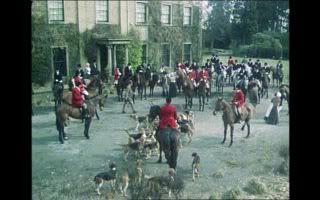
The first episode in the series Flambards (Yorkshire, 1979), adapted from the books by Kim Peyton, ‘Christina’ is set in the years before the First World War. In the episode, the orphan Christina Parsons (Christine McKenna) is sent to live at Flambards, her uncle William Russell’s (Edward Judd) estate. Russell plans to marry Christina to his son Mark (Steven Grives) in order to gain access to the inheritance that is due to become hers on her twenty-first birthday. Like his father, Mark is something of a bully, and Christina finds herself enjoying the company of his quieter brother William (Alan Parnaby). This episode of Flambards doesn’t really work out of context, unlike the isolated episodes of The Beiderbecke Affair and The Loner included on the first disc of this set. Instead, this episode is more of a ‘taster’ for the full thirteen-part series. 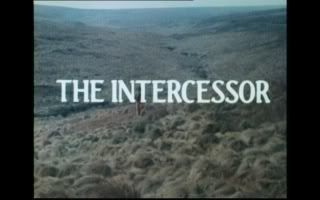
The set ends with an excellent episode from the 1980s anthology series Shades of Darkness (Granada, 1983-6). ‘The Intercessor’ opens on a lonely moor where a man, Garvin (John Duttine), walks alone towards an isolated house. Arriving at the house, he knocks on the door and asks for a room. The house belongs to the Falshawes. The man is a writer and has been staying in the local village but ‘can’t stand the sound of children’: his room in the village overlooks the school ‘and the children make such a noise it’s become quite impossible to write’. ‘All I want is a little peace and quiet, so I can get on with my work’, Garvin tells Mrs Falshawe (Maggie Ford), who agrees to rent a room to him. 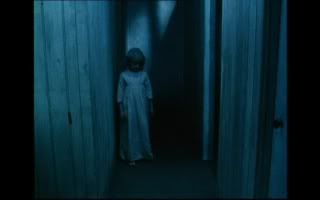
Falshawe claims that he finds the room he is given ‘a little chilly’, and at night he hears the sound of a young child crying. The next day, he asks about the child. ‘You needn’t worry; she won’t hurt you’, Rachel (Chrissie Cotterill), the Falshawe’s daughter, tells him. The next night, Garvin hears the crying again; a door opens. He sees the apparition of young girl, who pounds on one of the bedroom doors. ‘I think I know what tha’s seen. I tell you now, that’s no ghost to be afeared: it won’t harm thee’, Mr Falshawe (David Hargreaves) tells Garvin the next day. 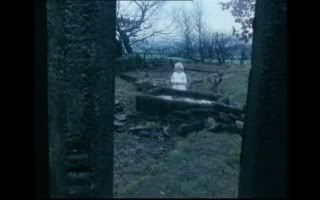
After experiencing more visions of the girl, and other visions including a young Falshawe involved in a tryst with a young woman, Garvin invites his friend, Doctor Mackinnon (Peter Hughes) to visit him. Garvin tells Mackinnon, ‘I wasn’t frightened by the little girl. One cannot be frightened by innocence’. However, he also admits that he sense evil and guilt in the house itself. Mackinnon seems to know the girl’s identity, and Garvin takes it upon himself to investigate the reason why the girl still haunts the house. A fantastic play about family guilt, ‘The Intercessor’ makes excellent use of its isolated rural locations. The set up, and Garvin’s first encounter with the ghost of the dead girl, is in some ways similar to ‘A Woman Sobbing’, one of three surviving episodes of the BBC’s horror-themed anthology series Dead of Night (1972) – in which Jane (Anna Massey) repeatedly hears the sobbing of a woman which may be an index of a supernatural presence or may be a symptom of her mental deterioration. The play benefits from solid performances and some very creepy visuals; it’s an atmospheric little piece that is well worth watching. 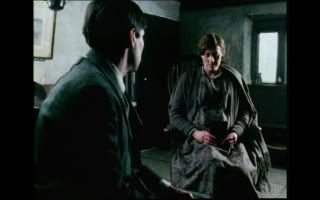
Disc One: The Beiderbecke Affair: ‘What I Don’t Understand Is This’ (51:32) Oranges and Lemons: ‘Brotherly Love’ (49:46) Play for Love: ‘The Party of the First Part’ (47:23) The Loner: ‘Dawson’s Complaint’ (26:19) Calendar People: Playwrights (26:27) Disc Two: ‘Coming Through’ (80:31) Flambards: ‘Christina’ (51:22) Shades of Darkness: ‘The Intercessor’ (52:36)
Video
All of the content is presented in its original broadcast screen ratio of 1.33:1, and break bumpers are present on all of the episodes. Some of the content (eg, Coming Through and ‘The Intercessor’) was shot entirely on 16mm film, but most of these episodes were shot on a mixture of videotape (for studio work) and film (for on-location footage). All of the episodes are well-presented on this DVD set. 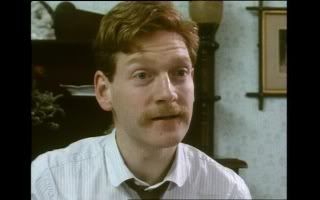
Audio
Audio for all episodes is presented via a two-channel monaural track, which is clear throughout. Sadly, there are no subtitles.
Extras
Included on disc one is an episode of Yorkshire Television’s Calendar People, the mid-1970s magazine show hosted by Austin Mitchell. The episode included in this set features Mitchell interviewing Plater, Colin Welland and Alan Ayckbourn. Plater expresses the importance of work and the lives of the working class for his plays: ‘You can only write about the world that you’re brought up in’, Plater asserts, ‘It’s a world of football teams […] and people who work for a living [….] The “work factor” is central to most of what I do’. 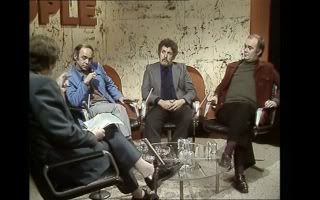
Colin Welland reflects on the North - South divide, and suggests that the difference between the North and South of England is ‘actually a myth’ and suggests that the perceived difference is in fact one of class, ‘Because there’s more working class people in the North than middle class people, and more middle class people in the South than working class people’. He suggests ‘I enjoy middle class standards of living, but I don’t think like a middle class man. I don’t care what my neighbours think, I don’t worry about what size my car is [or whether] my curtains are clean’. Plater also suggests that he chose writing because it meant he could work without being ‘owned by anyone’: he never wanted ‘a job’ where you were employed by someone else. When asked why they chose to write plays rather than novels, Welland says he likes theatre because ‘It’s direct [….] You’ve got an enormous audience immediately, and they respond directly’. Where Ayckbourn suggests that he initially took up writing ‘for money [….] and then you start to think “this is rather fun”’, Welland and Plater argue that their work is led by an agenda of furthering the values of the working class, with Welland declaring that he is ‘putting forward the cause of working people [….] I feel great a sense of responsibility that by sheer luck […] I got out of the drudgery of working for a living’. Plater suggests that his work is informed by a similar sense of duty. The playwrights also discuss the centrality of regional dialect to their work. Welland says that he ‘can sit in a Leeds pub and get more in my ears than I can sitting in a London pub’, and claims that he was criticised by The Guardian for suggesting that he finds more inspiration in the North than in the South. Likewise, Plater criticises the prevalence of RP in some quarters, saying, ‘The noise that the language makes, if it’s spoken with a Yorkshire accent or a Geordie accent or a Liverpool accent […] reveals more emotion. The standard of English that Margaret Thatcher speaks is designed to eliminate emotion [….] and eliminate morality’. 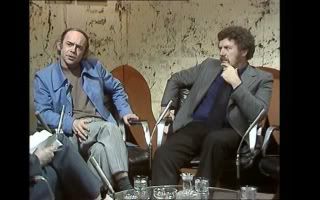
Discussing working practices, Plater claims that he works from nine in the morning to five in the evening. Plater also criticises models of production that seek to second-guess the tastes of the prospective audience, declaring that ‘I’m always very sceptical about phrases like “what audiences want”, because I don’t think you can prove it scientifically’. He’s more interested in ‘what the audience needs, emotionally and intellectually’. In contrast to Plater’s dogged commitment to his work, Welland thinks ‘work’s dispensable. I hate work’ and also claims that unlike the other two, he isn’t ‘a craftsman’ and admits that ‘there’s a couple of occasions where I’ve taken commissions for money’ and has struggled to write something worthwhile: he asserts that he has to have something to say before his work can begin to take shape.
Overall
Plater was one of our greatest television writers, and this set is a very worthwhile collection – although, as noted above, the episode of Flambards arguably needs to be seen in the context of the full series. The content of this set reveals the diversity of Plater’s talent, from the form of the sitcom (‘Dawson’s Complaint’) to the biopic (Coming Through). The episode of Calendar People that is included as contextual material is illuminating and helps to put some of these plays into context. This set comes with a strong recommendation. References: Greiff, Louis K, 2006: D H Lawrence: Fifty Years on Film. Southern Illinois University Press Hunt, Albert, 1981: ‘Alan Plater’. In: Brandt, George W (ed), 1981: British Television Drama. Cambridge University Press: 137-66 Plater, Alan, 1993: ‘Speaking to Nations (The 1993 LIRA Lecture)’. In: Elsaesser, Thomas et al, 1994: Writing for the Medium: Television in Transition. Amsterdam University Press: 118-30 Plater, Alan, 2005: ‘The drama of the North-East’. Colls, Robert et al, 2005 (eds): Geordies: Roots of Regionalism. Northumbria University Press: 111-32 Russell, David, 2004: Looking North: Northern England and the National Imagination. Manchester University Press Taylor, John Russell, 1978: The Second Wave: British Drama of the Sixties. London: Taylor & Francis For more information, please visit the homepage of Network DVD.
|
|||||

|